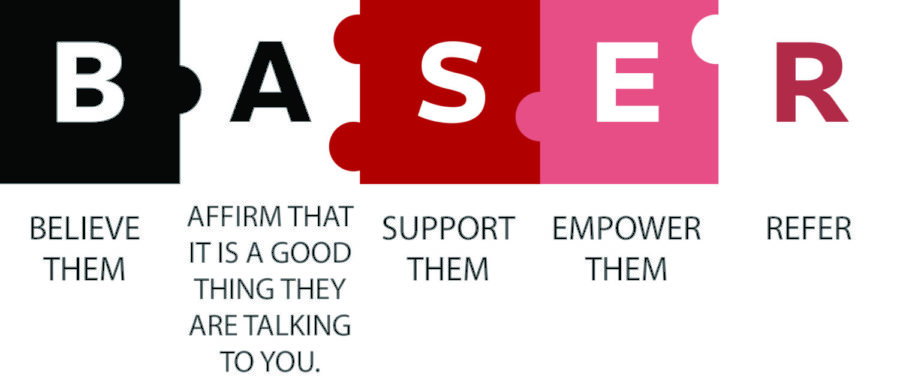Domestic abuse awareness
Graphic: Azwan Azhar/ Iowa State Daily
Baser is an acronym used for domestic abuse support and stands for: Believe, affirm, support, empower and refer.
October 30, 2013
October is Domestic Abuse Awareness Month in which men, women and bystanders — including adults, children and unborn babies fall victim to domestic abuse. There has been 244 people killed in domestic violence murders in Iowa since January 1995.
Domestic abuse affects ISU students, and departments such as the Margaret Sloss Women’s Center and ISU Police Department recognize it as an issue.
The Women’s Center, which year-round promotes equality, social change and support for students, holds an event each October called “Violence Leaves an Empty Chair at the Table.” On the designated day, Sloss House lines up empty chairs on one side of the walkway from the Sloss House to the Memorial Union. Jeni Roberts said the chairs almost reached the Memorial Union this year. On each chair is a victim’s domestic abuse experience.
Roberts also said that during the month of October, the Women’s Center speaks about topics like relationship violence to many groups in residence halls and the greek community.
However, Roberts said that the Women’s Center is always open year-round to students of all genders who need support for mundane, daily struggles or crises.
“We want to be here as a resource for students at all times. Students are encouraged to come to us if they have issues or concerns,” Roberts said. “When people come, it’s kind of bittersweet because it’s a terrible situation, but we’re glad they’re seeking our support.”
If victims are willing, the Women’s Center can refer them to other sources of support, such as the Student Assistance Services, Sexual Misconduct Student Planning and Programming Subcommittee, and the assault care center ACCESS in Ames with whom the Women’s Center does a lot of work.
Roberts said it is important for victims to understand that employees of the Women’s Center are mandatory reporters, meaning that if victims give information regarding perpetrators, they must report that information.
“If someone comes to us and they say they’ve had this experience and they want to talk about it, we would let them know upfront that we’re not confidential, and let them know confidential resources that there are, like ACCESS,” Roberts said.
Victims who do not want to share specific information about themselves or their abusers are also welcome to talk to employees of the Women’s Center.
“Some people won’t want to move forward at all. If they have been victimized, they may just want to share it with someone and have it end at that,” Roberts said. “A lot of times they can first not know how to handle it, can be in shock, blame themselves. Denying it is also common, making excuses for what happened as well because it can be a really difficult thing to process.”
The ISU Police also works year round to educate officers on how to deal with domestic abuse cases. They recently received a grant which they use to fund training for officers to deal properly with handling domestic abuse situations and are working closely with organizations like ACCESS to gain a better understanding.
“Doing situational training is the biggest thing for us. Putting officers in situations where we’re likely to see something similar pan out in a real-life scenario. Keeping that preparation current is really essential,” said Community Outreach Officer Anthony Greiter.
Greiter has worked with the Iowa Coalition Against Domestic Violence and the Iowa Coalition Against Sexual Assault in conjunction with ABC 5 to film two public service announcements on domestic abuse in October.
During the month of October, ISU Police alone have reported two sexual assault incidents and arrested one man for domestic abuse.
Mary Sirna, program manager for the Department of Public Safety, said that these numbers may not be indicative of intimate partner violence or relationship violence.
“There’s a difference between categorizing something as intimate-partner violence versus domestic abuse assault,” Sirna said. “In order to qualify as a domestic assault under the code there are certain elements.”
These elements include the couple having lived together at some point in time or having a child together. Such elements are not typical of the relationships of students at Iowa State who may have been intimate for years but never lived together.
“We could have three or four assaults that aren’t the bar fights between two guys downtown drinking beer,” Sirna said. “Those assaults will be charged the same way as a dating relationship, but clearly one’s an intimate partner relationship and one’s not.”
Roberts said that when dealing with a victim of domestic abuse, whether man or woman, not blaming the victim is of the utmost importance. Using the acronym BASER will help support victims.
The “B” stands for believing victims, which empowers them and encourages them to talk about their experience. Affirmation is the next step in which friends or family affirm that victims should share their experience and gain support. It is also important to tell victims at this point that they are not to blame for their assault.
“You did not make the choice to be assaulted,” Roberts said to tell victims. “The perpetrator is the only one who could make that choice and only they could prevent it.”
The next steps include providing and finding support for victims and empowering them to make their own decisions as to how they want to deal with their own recovery. The last step is to refer victims to proper support systems if it is the route they choose to take.







